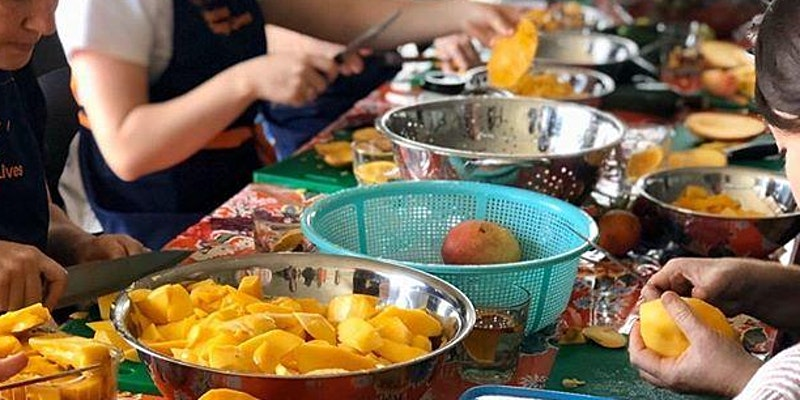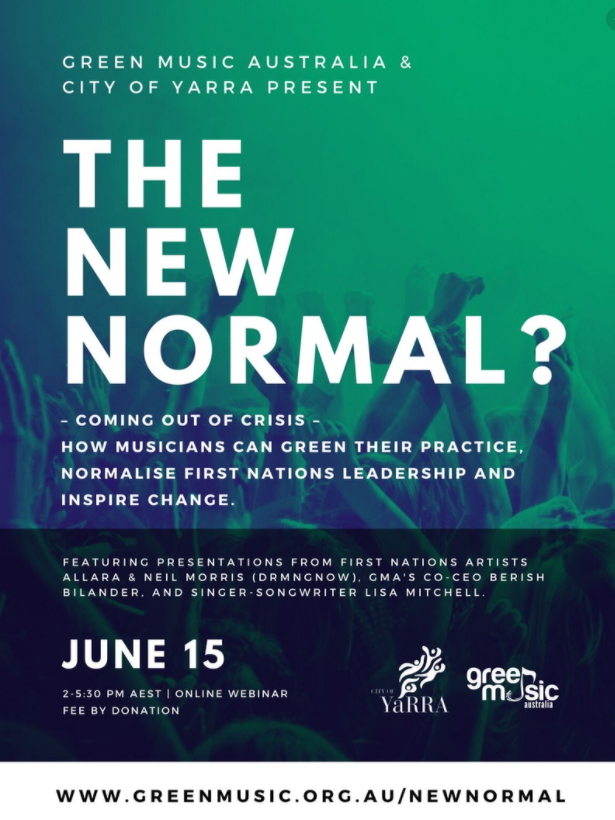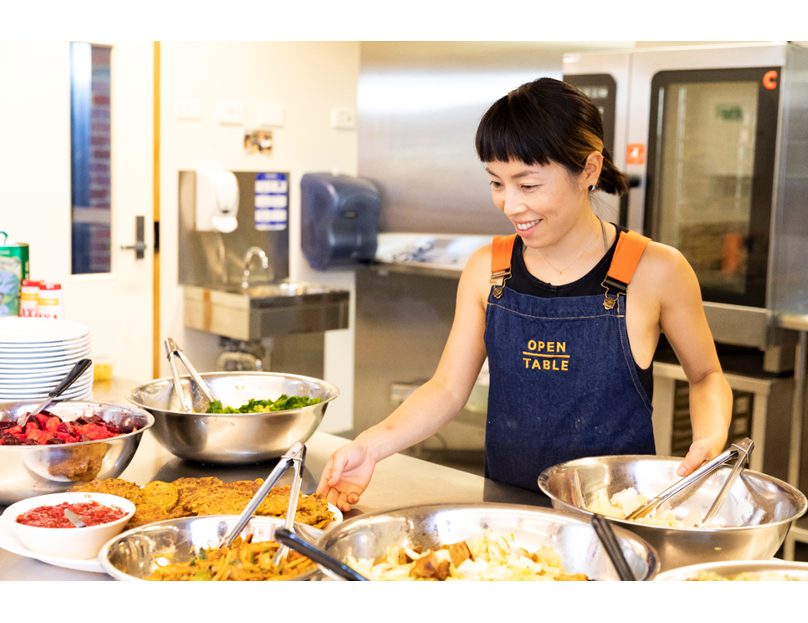These community-led projects are examples of projects delivered with financial support from a Yarra grant.
Have you got a great idea to take climate action in Yarra and help create a sustainable city? Find out more about applying for grants to take climate action here.

Open Table: No Waste Cook Club
Open Table’s No Waste Cook Club offers interactive cooking workshops inspiring residents with creative, yet simple ways to reduce household food waste. In response to the COVID-19 restrictions, these workshops were largely been delivered online.
The ‘No Waste Cook Club’ concept prevents food waste going to landfill, reducing polluting methane emissions. Arguably just as importantly, Open Table have recognised that if we are to be successful in taking climate action we need communities with strong social connections — communities where people meet up, learn and take action together.
Taught out of the Bargoonga Nganjin, North Fitzroy Community Hub kitchen, the free sessions are held 3 to 4 times a month. Participants learn how to think creatively in the kitchen, and to shop and cook in a way that is healthier, sustainable and wastes less food. Prior to the pandemic-related restrictions, participants would cook lunch together made from donated surplus food and enjoy a sustainable food discussion over a shared meal.
The facilitators demonstrate techniques to reduce food waste, share tips on appropriate food storage, food preserving, meal planning, and composting and worm farming practices. Food waste education materials equip participants with the knowledge, skills and recipes top make changes to in their food preparation at home.
Open Table have successfully inspired and educated hundreds of local people about reducing food waste. 82% of participants reported joining the workshops to learn how to reduce their household food waste, and 100% of those responded that the workshops helped them achieve this goal.
Through the workshops, Open Table have brought together diverse groups of people, with the sharing of food being a bridge between cultures. Participants were mostly women, diverse in age and cultural backgrounds. 96% of survey respondents said they had the opportunity to interact with people they wouldn't normally meet, and 67% responded that they felt a stronger connection to their community as a result of attending the workshop.

Green Music Australia (GMA): The New Normal
How musicians can green their practice, normalise First Nations leadership and inspire change
Engaging over 100 musicians and industry professionals, GMA explored the creation of a ‘New Normal’ in a way that honours First Nations cultural practices and fosters a new vision for the local music scene centred on justice and healing. The vision was one that places First Nations First; strives to regenerate Country; is powered by renewables; and transforms waste into gifts.
GMA have long campaigned for strong action on the climate crisis. They launched a Climate Change Declaration with over 80 prominent artists and industry representatives banding together to call on all levels of government to take urgent climate action to keep global heating below 1.5 degrees.
Responding creatively to the COVID-19 restrictions, GMA redesigned their original program to deliver a three-hour live workshop online with many more people viewing the recording. Berish Bilander, CEO of Green Music Australia, and prominent Australian artist Lisa Mitchell explored the intersection of our two crises – health and planet – and how they're forcing us to re-evaluate everything.
First Nations artists Mandy Nicholson, Allara and Neil Morris (DRMNGNOW) presented important content around the role of music within society and First Nations leadership within the music sector and beyond. The event also included 10 high profile artists: Briggs, Jack River, Montaigne, Jen Cloher, Gretta Ray, Heidi Lenffer (Cloud Control), Mama Kin, Allysha Joy, Courtney Barnett and several industry professionals representing companies such as Untitled Music Group, Sony Music Group, Bakehouse Studios and Mushroom Group.
As part of the project, Green Music Australia (GMA) put together online resources for non-Indigenous allies supporting First Nations Leadership and environmental action in the music industry. Once the live music scene comes back to life, GMA intend to continue to utilise the workshop resources to continue to advocate for First Nations solidarity and climate justice.
Find out more about Green Music Australia and access The New Normal resources and workshop recording.

Open Table: Free community lunches
Open Table has tapped into the great ability that food has to unify us, no matter who we are or what our backgrounds may be.
Open Table collects surplus food and turns it into nutritious, vegetable-based lunches to share with the community. The free community lunches are volunteer run and open to all members of the community.
With the continued efforts to slow the spread of COVID-19, the free community lunches have needed to be temporarily suspended this year. In the meantime, Open Table is working with Cultivating Community and Yarra Libraries to provide 170 free fresh food parcels weekly to those most in need.
Throughout 2019, Open Table delivered 50 community lunches across three locations in Fitzroy, North Fitzroy and Carlton North. Each month they fed well over 100 people of diverse ages and cultural backgrounds. Through relationships with local businesses, volunteers collected around 200 kilograms of surplus food per month. On top of the food served as free meals, there is an extra 10 to 30 kilos of fresh produce that is given away each week.
The lunches are both building community cohesion as well as increasing awareness of food waste and its environmental impact. Ninety percent of surveyed attendees felt more connected to their neighbourhood and community after attending an Open Table lunch, and over 60% of people surveyed had not attended any other community based social events that month.
The lunches are largely thanks to a dedicated team of 40 volunteers, with around half from culturally and linguistically diverse backgrounds. They’ve developed skills to cook creatively with donated food, learnt how to avoid food waste. It is the volunteers that have enabled the impact of the community lunches to grow.
Find out more about Open Table.
Small project grants
The following climate action and sustainability projects received grants of up to $1,000 to help get their project off the ground. Community groups and organisations can apply for small project grants at any time throughout the year. A decision is usually made within a month. Further information here.
Victorian SES Northcote Unit: Sustainable Hydration Project
The SES volunteers that service the City of Yarra are now avoiding the use of hundreds of single use plastic water bottles. A Small Project Grant enabled the unit to purchase high quality, reusable metal water bottles for their members along with the installation of a chilled water unit at their headquarters. Ongoing, response vehicles will be equipped with suitable larger capacity water containers to provide refill stations. The SES members are very proud to be going plastic free!
Reducing Our Footprint: Community development and digital workshop pilot
Reducing Our Footprint (ROF) offered a mixture of face-to-face and online workshops to engage Yarra community members on a sustainability journey. ROF ran several workshops across Yarra Libraries, including some in conjunction with the National Sustainable Living Festival, on topics including energy saving, minimalism, eco-friendly cleaning and a digital session on sustainable fashion.
North Fitzroy Community Garden (Rushall Garden): Community compost hub
The community compost hub at Rushall Garden provides a local option for residents to drop off their food waste for recycling, keeping it out of landfill. As a result of its success, and an increasing numbers of users, the community garden required additional capacity to manage the organic material. Additional compost bins were funded via a small project grant.
Have a question?
If you have a question about the annual grants, you can ask us online, or call us on 03 9205 5170 or 03 9205 5146.
